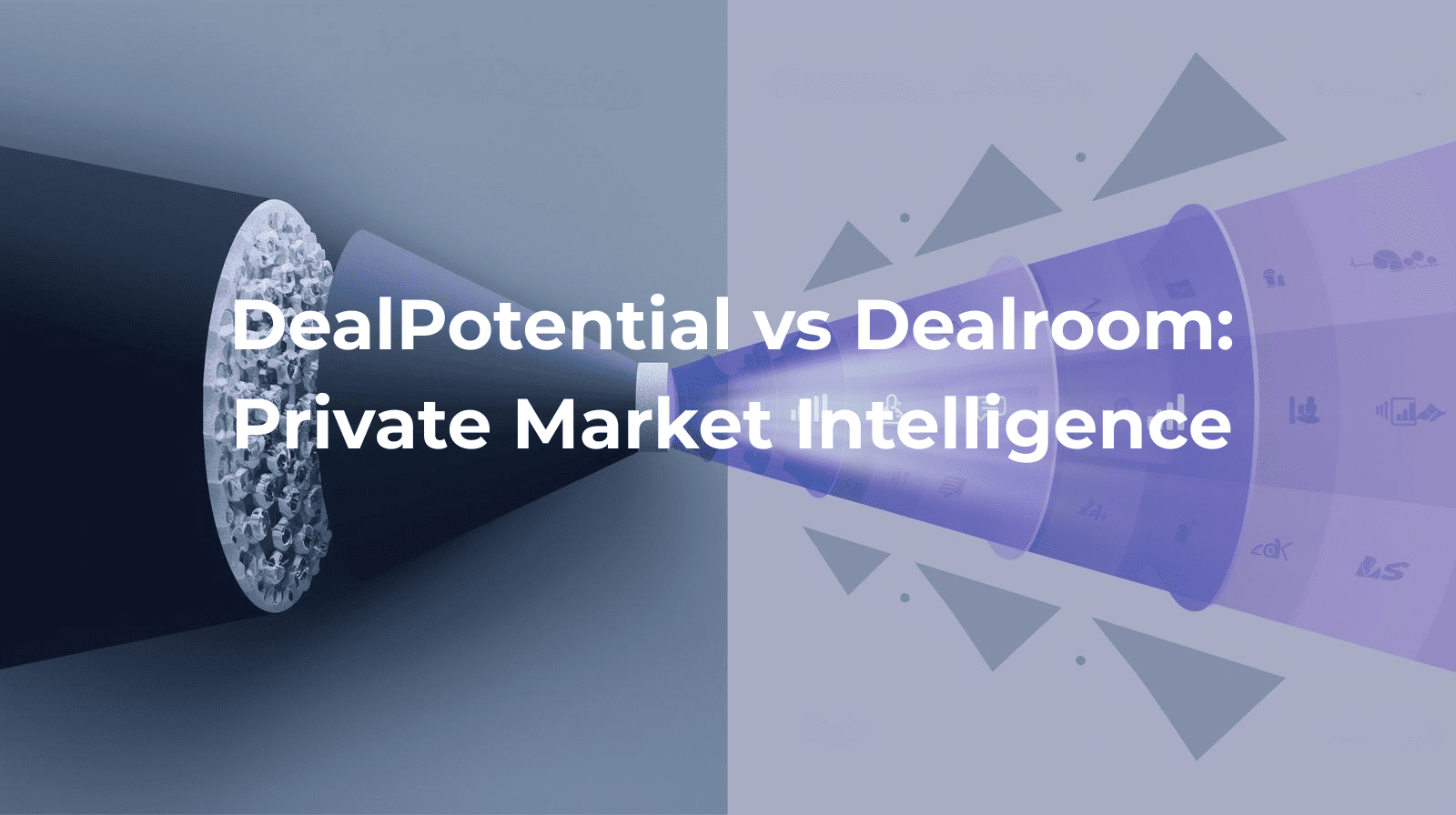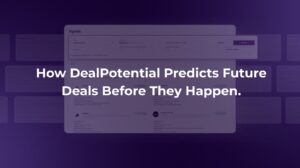
Best Sources for Private Company Valuation Multiples by Industry
The best sources for private company valuation multiples by industry, how investors use them, and key limitations in private market analysis.

Private market investors face an evolving data landscape.
Platforms must now go beyond static databases to deliver speed, foresight, and context.
In this article, we explore DealPotential vs Dealroom and how these two platforms approach private market intelligence differently. The comparison helps investors evaluate which tool better aligns with forward-looking sourcing and decision-making.
While Dealroom has earned recognition for mapping the startup startup ecosystem globally, DealPotential focuses on predictive signals and contextual data. Dealroom offers a valuable snapshot of who’s out there. DealPotential adds when and why that matters.


DealPotential classifies over 7 million companies by vertical, subindustry, and strategic activity, helping investors cut through noise and focus on fit.
Dealroom offers strong coverage of current and past company profiles. However, it’s primarily descriptive. DealPotential integrates predictive analytics that flag companies likely to raise, restructure, or exit within 6–12 months.
This proactive layer supports earlier outreach and sharper timing. Investors don’t just identify opportunities they anticipate them.
they anticipate them. Read more about why contextual insights are becoming critical.
One of DealPotential’s core advantages is its real-time company signal engine. Unlike Dealroom’s quarterly or manually updated datasets, DealPotential uses machine learning to track:




This helps surface deals before they hit the mainstream radar.
While Dealroom serves analysts, founders, and institutions broadly, DealPotential is engineered for investors specifically. Its UI is built around filtering for:




Combined with contextual scoring, users spend less time sorting and more time evaluating.
Dealroom’s enterprise model serves governments, corporates, and incubators.
Its open data initiatives are strong but limited in predictive depth. DealPotential, by contrast, is accessible to family offices, emerging managers, and VC/PE teams alike. Its pricing scales with usage, not headcount.
For teams already using Dealroom, DealPotential is not a replacement. It’s a next-gen layer that adds predictive clarity to descriptive data. Think of it as real-time radar vs static maps.
When comparing DealPotential vs Dealroom, it’s clear both platforms serve important roles. Dealroom tracks the ecosystem. DealPotential helps investors act within it.
If you’re looking to anticipate not just observe private market shifts, explore what DealPotential can deliver.
You can also compare DealPotential vs Grata vs SourceScrub to see how we differ from other signal platforms.
SHARE:
Book a free demo with DealPotential and get real-time insights on the next billion-dollar opportunities.

The best sources for private company valuation multiples by industry, how investors use them, and key limitations in private market analysis.

AI-driven due diligence software helps M&A teams assess companies earlier. DealPotential supports early-stage commercial due diligence.

Predict future M&A deals using early indicators and AI signals. Learn how DealPotential identifies acquisition-ready companies earlier.
We use cookies to improve your experience, analyze web traffic, deliver customized content, and support marketing efforts.
DealPotential Investment Intelligence Platform Proposal Agreement
WHEREAS, the Seller agrees to provide access to the DealPotential Investment Intelligence Platform,
WHEREAS, the Client agrees to purchase the DealPotential Investment Intelligence Platform according to the terms and conditions laid out in this contract.
THEREFORE, in consideration of the mutual agreement made by the parties hereto, the Seller and the Purchaser (individually, each a “Party” and collectively, the “Parties”) agree to the following:
2. Subscription: By subscribing to the Platform, you agree to pay the monthly or yearly subscription fee, as specified in your subscription plan.
3. Payment: Payment is due monthly in advance and processed via Stripe. The subscription renews automatically until cancelled.
4. Cancellation: You may cancel your subscription at any time, and it will take effect at the end of the current billing cycle. No refunds will be provided for partial months.
5. Data Privacy: We are committed to safeguarding your data. Please refer to our Privacy Policy for details on data handling and protection.
6. Intellectual Property: All content, data, and reports provided by the Platform are protected by intellectual property laws and are for your internal use only.
7. Termination: We reserve the right to terminate your access to the Platform for any violation of these terms or for any reason at our discretion.
8. Governing Law: These terms are governed by the laws of Sweden, and any disputes shall be subject to the exclusive jurisdiction of the courts in Sweden.
10. Disclaimer: We disclaim all responsibility for any decisions made by users based on the data provided in our platform. All investment decisions are solely the responsibility of the user. We are not involved in any user decisions and only provide data and assessments for informational purposes.